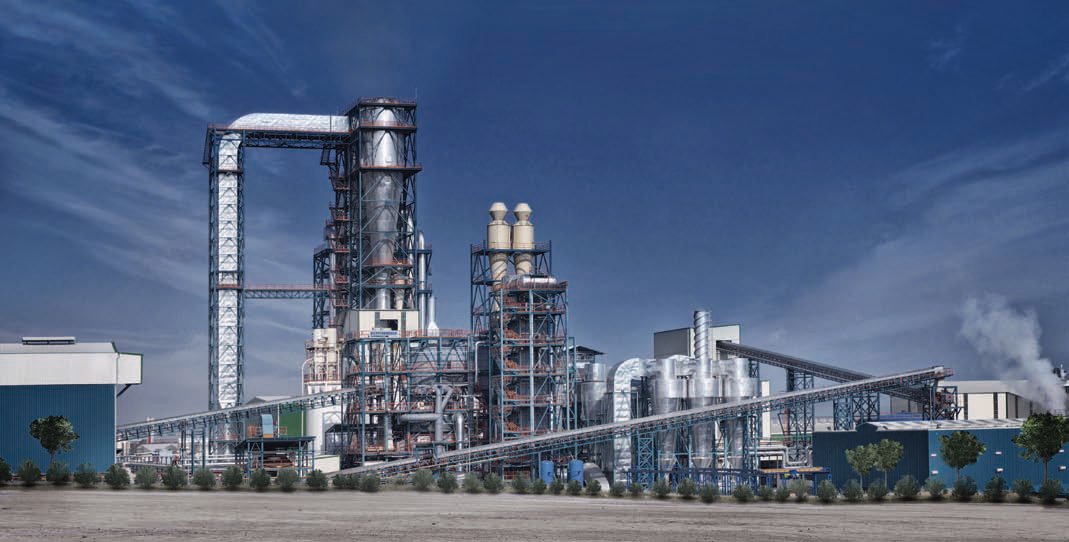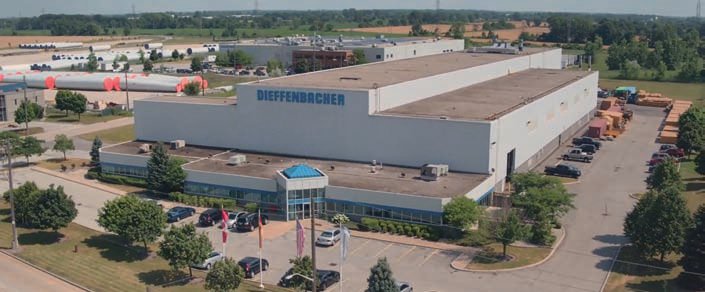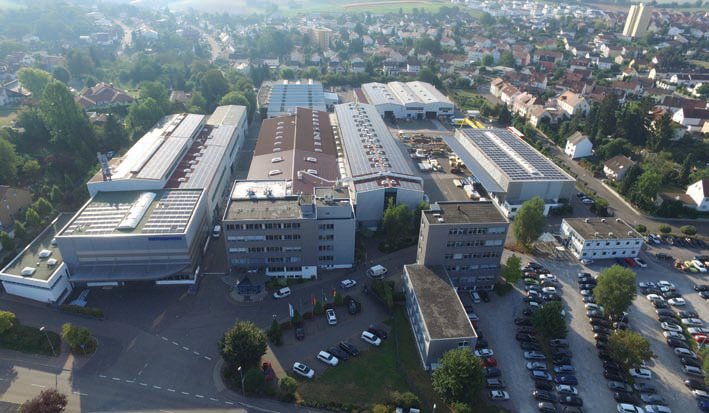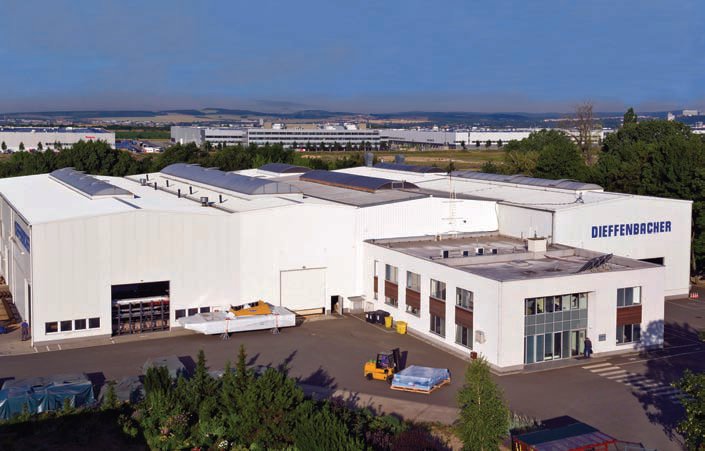Dieffenbacher: very much a family undertaking
19 May 2017Dieffenbacher is world renowned as a maker of press systems and complete production lines for the wood based panel industry. It is family owned; last year Christian Dieffenbacher became the latest family member to join.Wood Based Panels International talked to him about the challenges and the responsibilities, and gained insights into the family business
WBPI: Mr Dieffenbacher, in January 2016 you and Volker Kitzelmann joined the corporate management of your family business, and you now run the company together with the two existing managing directors, Dr Günter Kuhn and your father, Wolf-Gerd Dieffenbacher. Does this mean that the generation change at Dieffenbacher is now complete?
CD: The generation change is in full swing but is certainly not yet complete. It’s a process. I have moved up and am taking on more and more responsibilities, but my father is still acting as the spokesperson for the corporate management. In fact, the pivotal reason for enlarging the corporate management was the increased growth and internationalisation of the company. Over the last 15 years, Dieffenbacher has grown rapidly, taken over many companies and established branches and production sites around the world. We were formerly known as the press specialists; today we’re known all over the world for our competence in plant engineering.
As a result, we have adapted our organisational structure in a number of areas within the company – including in the corporate management team – to respond to these changes. Even with our larger size, though, we continue to work quickly, flexibly and efficiently for our customers.
WBPI: What corporate achievement are you you most proud of? CD: Winning complete plant projects from new customers such as Norbord, Arauco, Fantoni, Metro-Ply and PanelPlus is extremely gratifying. We’re also pleased to be working again with Swiss Krono. All of these companies are industry leaders. Overall, we’ve expanded our leading market positions in Latin America, South East Asia and China, and we’re also making good progress in the United States and Europe. On average, we’ve won a major new contract monthly over the last year and a half, and we’ve delivered a plant each month over the course of the year. That’s a record for us, and the outlook is also very promising.
WBPI: What opportunities, challenges and changes do you see in the wood based panel industry? How is Dieffenbacher dealing with these?
CD: Customers are becoming less and less interested in individual machines. Overall solutions are what’s required, and this is also the case if a company is modernising or expanding. Cross-machine aspects, such as efficient networking and automation, are becoming more important, along with a holistic consideration of plants over their entire life cycle.
How easy is it to maintain a plant? How good is the information it provides? How can upgrades be planned from the outset? How can overall plant efficiency be maximised? We need to follow thought processes in the field of planning and engineering and to think outside the box. Here’s a practical example: Recently, as part of a project, we developed a proposal for a plant configuration that enabled the operating organisation to save an entire building level in the plant; and this was never stipulated in the specification. The expertise and experience of our engineers produce not only good products but also very costeffective overall solutions. This is in perfect keeping with our promise that Dieffenbacher plants offer the "gold standard" in efficiency.
WPBI: Dieffenbacher operates globally. What challenges does this present?
CD: In these times of increasing internationalisation, the challenge is to remain close to customers worldwide. I am personally involved in talks with customers all over the world and am constantly travelling to meet with them.
Our production and service network is also designed to be able to respond very quickly and competently to local customer requirements. Over recent years, we have successfully created a flexible production network that meets a uniform standard of Dieffenbacher quality worldwide. We can now live up to the "Made in Germany" promise at all production sites. Ultimately, the opportunities offered by internationalisation outweigh the risks.
WBPI: Can you give us a glimpse into the future of the wood based panel industry? What global trends do you anticipate and how are you addressing Industry 4.0, which is the key topic for the future?
CD: Our customers all over the world will always strive to increase productivity and profitability. But I wouldn’t call that a global trend. I think that anyone who understands the market will realize that there’s actually no such thing as a global trend.
Each customer has their own individual needs which are influenced by different market conditions, such as the region or market position of the customer. At Dieffenbacher, we work to understand the individual needs of each customer and tailor our offerings to their specific requirements. I believe this is more helpful to individual customers than if we follow a trend that ultimately has nothing in common with the customer's reality.
We’re addressing the topic of Industry 4.0 in a similar way. With our Automation Business Unit, we are well-positioned in this area. Rather than trying out all kinds of things just because they are technically feasible, we discuss the issue directly with our customers to clarify which innovations will actually create added value. As part of Industry 4.0, we’re therefore currently focusing on digitalisation of the factory.
One example is the new Siemens S7 controller that is used in all CPS+ plants. It uses improved real-time protocols to enable predictive maintenance of the plant. In addition, we’re working on a digital customer platform, and we will be presenting the first development stage of this platform at Ligna. In our Composites Business Unit, we have already implemented Industry 4.0 in the BMW production cells for carbon parts. The systems are able to communicate with other sites, and components can be traced through to the very end of the life cycle.
WBPI: As you just mentioned, Dieffenbacher is not only active in the wood based panel sector. Can you give us a brief overview of the other business areas in which you operate, and how this helps the panel industry?
CD: We believe that some degree of diversification is definitely necessary and is a sign of the strength of our company. We’re not dependent on the development of a single industry sector. Our Composites Business Unit is mainly active in the automotive supplier industry and supplies well-known customers, such as BMW, with complete systems for manufacturing lightweight components made of glassfibre or carbon-fibre-reinforced plastics. We are also continually expanding our newest division: Recycling.
We see wood recycling, in particular, and recycling in general, as a major growth area in the future. Huge potential is waiting to be tapped in this area worldwide. We discovered this potential at a very early stage and are now continuously developing it. In the area of recycling, our major selling point is our capacity to innovate.
We develop new solutions for our customers to help them obtain new raw materials or energy from waste products. In the wood sector, in particular, we have the advantage of being very familiar with the market and the needs of customers and can transfer technology between our Wood and Recycling Business Units.
For our customer Pfleiderer, for example, we’ve developed an innovative overall solution for preparing wood for recycling: In addition to using our sifter technology, we’ll deploy a sensor-based X-ray sorting system. This will achieve the required purity while minimising wood losses. This concept also removes a high proportion of unintended MDF particles and fibres from the waste wood flow, which helps to increase plant availability for subsequent processes.
WBPI: You’ve given us an in-depth insight into your company. Now we’d like to find out a bit more about your professional background. Was it obvious even as a child that one day you’d join the family business, or could you have imagined taking another direction outside Dieffenbacher?
CD: For me, luckily, there wasn’t a prescribed path that inevitably led to the Dieffenbacher corporate management. My family gave me a lot of freedom to develop independently of Dieffenbacher. Nevertheless, I naturally had a family bias. If you are familiar with mechanical engineering and plant construction from childhood, it’s not surprising that sooner or later you’ll become interested in it. Our company and my father's work fascinated me right from my school days, and so initial points of contact were automatically created. During school vacations, I had jobs in Eppingen or other locations.
After graduating from the technical high school, I spent a long time in Canada, followed by a placement lasting several months at an MDF plant construction site in China. This was a very valuable experience, as I obtained first-hand knowledge of one of our projects from a customer perspective. The next logical step was university.
While studying for a degree in industrial engineering at the RWTH Aachen University, and with a major in mechanical engineering, I acquired the business and technical expertise that forms the basis of my daily work now. However, I thought it was particularly important to obtain my first professional experience following graduation outside the home comfort zone. So, initially, I became a consultant.
At P3 Ingenieursgesellschaft, I acquired precisely the experience that is useful to me now. I was able to work on projects for companies such as BMW and Daimler, and I gained practical experience in areas such as strategy development for production, purchasing and supplier management. However, even during this time I always tried to keep abreast of current topics at Dieffenbacher by attending trade fairs and visiting customers .
Afer two years at P3, in March 2014,I finally joined the family business. Based in the Wood Business Unit, I was responsible for our sites in Asia. As a team, we have significantly developed the Asian market, in particular China and South East Asia. Since I joined the corporate management team, my responsibilities have naturally increased. In addition to being responsible for the Wood Business Unit, I’m also in charge of purchasing, marketing and IT.
WBPI: Finally, we’d like to know a little more about you as a person. How do you like to spend your (limited) leisure time?
CD: I’ve always been keen on any kind of sports. I like to play tennis and often go cycling, on road bike or mountain bike. I would miss having a regular sports activity. It’s the ideal way to unwind after work. Friends and family are a very high priority in my life, and I try to spend as much time with them as possible. My wife is a medical doctor. If we have a little more time, we love travelling. We are both interested in other cultures and always enjoy discovering new countries and meeting people. That’s a hobby that’s wonderfully easy to combine with my work when I visit our customers all over the world.




